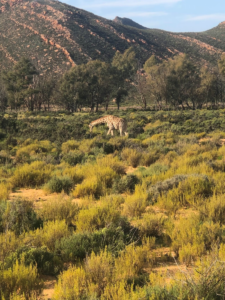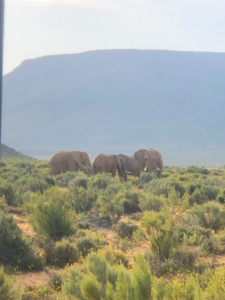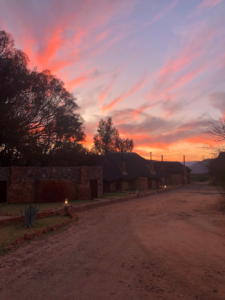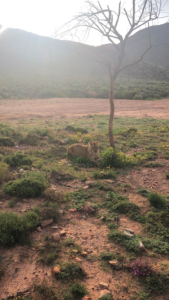Kayla Nemirovsky
UMBC Faculty-Led: Global Community Engagement and Social Change in South Africa
Major: Math and Financial Economics
July 26, 2023
 Hi everyone! My name is Kayla Nemirovsky, I am a rising sophomore Math and Financial Economics double major and I am currently sitting in the airport waiting for my flight to Cape Town, South Africa! The last couple of days have been a whirlwind of (slightly procrastinating) packing, reading through our finalized itinerary, and downloading assigned readings! Still haven’t 100% figured out what I’m going to do on a 15-hour flight, but I’m sure between reading, sleeping, watching movies, and listening to music it will fly by and I’ll be on the ground in no time!
Hi everyone! My name is Kayla Nemirovsky, I am a rising sophomore Math and Financial Economics double major and I am currently sitting in the airport waiting for my flight to Cape Town, South Africa! The last couple of days have been a whirlwind of (slightly procrastinating) packing, reading through our finalized itinerary, and downloading assigned readings! Still haven’t 100% figured out what I’m going to do on a 15-hour flight, but I’m sure between reading, sleeping, watching movies, and listening to music it will fly by and I’ll be on the ground in no time!
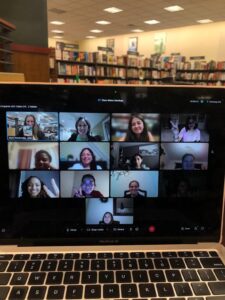 This trip is a faculty-led study abroad with 16 total students. Leading up to our departure, we have had six pre-departure sessions where we have been able to get to know each other, meet with EduAfrica (the organization that we are working with that is based in South Africa), and learn about South African history and culture. We’ve also been discussing the course, called “Global Community Engagement and Social Change”, and what we will be doing once we get “on the ground”. Once in Cape Town, we will be meeting with local leaders, engaging in service learning projects, and getting to know the local culture. I can’t wait to share all my experiences! One of the things that I am most looking forward to is getting to interact with members of the communities we are staying in. I feel like you learn a lot more about a city and its people from talking to those that live there as opposed to just reading about it, driving through it, and looking around. Even though I’ve traveled a good bit around Europe, this is going to be my first time traveling to Africa and I’m excited to compare what my experiences are like. Alright! Looks like it’s time to board my flight! See you all in Cape Town!
This trip is a faculty-led study abroad with 16 total students. Leading up to our departure, we have had six pre-departure sessions where we have been able to get to know each other, meet with EduAfrica (the organization that we are working with that is based in South Africa), and learn about South African history and culture. We’ve also been discussing the course, called “Global Community Engagement and Social Change”, and what we will be doing once we get “on the ground”. Once in Cape Town, we will be meeting with local leaders, engaging in service learning projects, and getting to know the local culture. I can’t wait to share all my experiences! One of the things that I am most looking forward to is getting to interact with members of the communities we are staying in. I feel like you learn a lot more about a city and its people from talking to those that live there as opposed to just reading about it, driving through it, and looking around. Even though I’ve traveled a good bit around Europe, this is going to be my first time traveling to Africa and I’m excited to compare what my experiences are like. Alright! Looks like it’s time to board my flight! See you all in Cape Town!
Week One
Mholweni! That’s hello in Xhosa, one of the 12 official languages in South Africa. It’s been so awesome to finally be on the ground in Cape Town, and I hope you all enjoyed my UMBC Life Takeover this week. If you missed it the posts are up and the stories are saved in the Study Abroad Highlight! South Africa is a beautiful country, and Cape Town is one of the most diverse cities I’ve ever been in. All of the people we have interacted with have been eager to ask how we are liking Cape Town and give us suggestions for how to spend some of our time here.
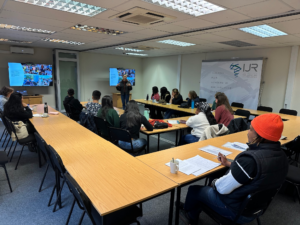 In our first week, we have been able to do so many informative activities and have great group discussions. We started off on the first day with a social justice workshop through the Institute for Justice and Reconciliation. We talked about many of the ongoing challenges in South Africa, including the socio-political challenges, continued divisions and disparities between racial groups in communities and within the education system, the large numbers of sexual and gender-based violence, and some of the challenges faced by youth. This workshop allowed us to develop a basic understanding of civic life in South Africa and was a strong foundation for our observations and discussions moving forward. Some other workshops and experiences that have allowed us to learn about Cape Town’s history have been a guided tour of the District Six Museum and Robben Island, a lecture and discussion with Lionel Davis, and a walk through Bo-Kaap with one of its residents. District Six was a community in Cape Town that was destroyed during apartheid when its black and colored citizens were sent to townships and communities outside of Cape Town. Apartheid was the government policy that divided people by race in all aspects of life, from where they lived to what schools they went to and the opportunities they were given. Although the system of apartheid ended in 1994, many original residents and their families are still fighting to move back to their true homes. Black and colored freedom fighters during apartheid were sent to Robben Island as political prisoners, including Nelson Mandela and Lionel Davis. We were able to meet Lionel Davis and he was able to share his story of growing up during apartheid and his contribution to the fight to end it. An idea that he emphasized, which was also echoed by several other speakers, was the importance of working within communities and with the younger generation in order to mentor and inspire youth to reach their full potential.
In our first week, we have been able to do so many informative activities and have great group discussions. We started off on the first day with a social justice workshop through the Institute for Justice and Reconciliation. We talked about many of the ongoing challenges in South Africa, including the socio-political challenges, continued divisions and disparities between racial groups in communities and within the education system, the large numbers of sexual and gender-based violence, and some of the challenges faced by youth. This workshop allowed us to develop a basic understanding of civic life in South Africa and was a strong foundation for our observations and discussions moving forward. Some other workshops and experiences that have allowed us to learn about Cape Town’s history have been a guided tour of the District Six Museum and Robben Island, a lecture and discussion with Lionel Davis, and a walk through Bo-Kaap with one of its residents. District Six was a community in Cape Town that was destroyed during apartheid when its black and colored citizens were sent to townships and communities outside of Cape Town. Apartheid was the government policy that divided people by race in all aspects of life, from where they lived to what schools they went to and the opportunities they were given. Although the system of apartheid ended in 1994, many original residents and their families are still fighting to move back to their true homes. Black and colored freedom fighters during apartheid were sent to Robben Island as political prisoners, including Nelson Mandela and Lionel Davis. We were able to meet Lionel Davis and he was able to share his story of growing up during apartheid and his contribution to the fight to end it. An idea that he emphasized, which was also echoed by several other speakers, was the importance of working within communities and with the younger generation in order to mentor and inspire youth to reach their full potential.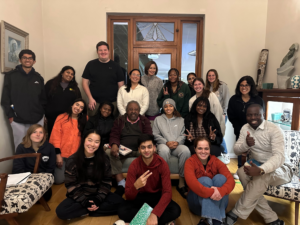
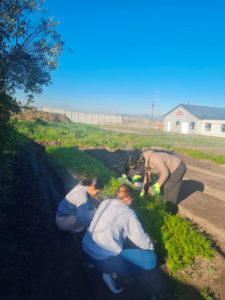 As I mentioned in my last blog, a big part of this course is service learning. As a group, we met with a UBU, a home-building NGO, and an elite soccer school called Ubuntu Football Academy. We have all also engaged in service learning with one of 4 organizations: Baphumelele, a youth home, daycare center, and medical service provider, Fountain of Hope, a garden and sanitary product creating site that is staffed by members of the community and works with young adults to teach them important life skills, Princess Vlei, an organization that works on cleaning and restoring a lake, and Butterfly Art Project, a youth program that teaches students to express themselves through art. I am placed at Fountain of Hope, and I have greatly enjoyed getting to talk with some of the employees there to learn about their cultures and stories while also assisting with work around the garden. As a whole group, we have been able to use our personal experiences and the stories and experiences of NGO leaders to discuss how to best engage in ethical service learning and contribute to an organization while creating a lasting impact on the community. As we are here talking about social change, there is a taxi strike over disputes of ownership and driving conditions. Taxi drivers are blocking off main roads in and to the city, which is also preventing many people from getting to and from work. While this has inconvenienced some of our travel plans, with one of our workshops needing to be rescheduled, it is also really cool to see the people of South Africa exercising their voices and advocating for change as this class is about social change.
As I mentioned in my last blog, a big part of this course is service learning. As a group, we met with a UBU, a home-building NGO, and an elite soccer school called Ubuntu Football Academy. We have all also engaged in service learning with one of 4 organizations: Baphumelele, a youth home, daycare center, and medical service provider, Fountain of Hope, a garden and sanitary product creating site that is staffed by members of the community and works with young adults to teach them important life skills, Princess Vlei, an organization that works on cleaning and restoring a lake, and Butterfly Art Project, a youth program that teaches students to express themselves through art. I am placed at Fountain of Hope, and I have greatly enjoyed getting to talk with some of the employees there to learn about their cultures and stories while also assisting with work around the garden. As a whole group, we have been able to use our personal experiences and the stories and experiences of NGO leaders to discuss how to best engage in ethical service learning and contribute to an organization while creating a lasting impact on the community. As we are here talking about social change, there is a taxi strike over disputes of ownership and driving conditions. Taxi drivers are blocking off main roads in and to the city, which is also preventing many people from getting to and from work. While this has inconvenienced some of our travel plans, with one of our workshops needing to be rescheduled, it is also really cool to see the people of South Africa exercising their voices and advocating for change as this class is about social change.
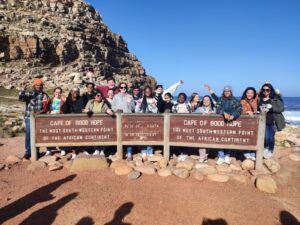 Of course, I could not end this blog post without talking about the amazing geographical attributes of South Africa as well as the delicious food we’ve had. The whole city of Cape Town is surrounded by mountains, including Table Mountain which we will be visiting later on in this trip! As a group, we have gone to Cape Point, which is the most south-western point of the African continent. It is home to many different animals, including baboons, penguins, elands, and hyraxes and has beautiful cliffs and incredible ocean views. We also visited Chapmans Peak, which has some breathtaking views as well. The food here has been delicious for every single meal. Our first night in Cape Town we went to Mama Africa, a traditional African restaurant. Besides having delicious foods, including crocodile, if anyone wants to know I think the taste and texture is best described as a combination of chicken and cod fish, there was also a woman walking around with face paint to draw traditional designs and a live band playing and encouraging diners to come dance and participate in their fun!
Of course, I could not end this blog post without talking about the amazing geographical attributes of South Africa as well as the delicious food we’ve had. The whole city of Cape Town is surrounded by mountains, including Table Mountain which we will be visiting later on in this trip! As a group, we have gone to Cape Point, which is the most south-western point of the African continent. It is home to many different animals, including baboons, penguins, elands, and hyraxes and has beautiful cliffs and incredible ocean views. We also visited Chapmans Peak, which has some breathtaking views as well. The food here has been delicious for every single meal. Our first night in Cape Town we went to Mama Africa, a traditional African restaurant. Besides having delicious foods, including crocodile, if anyone wants to know I think the taste and texture is best described as a combination of chicken and cod fish, there was also a woman walking around with face paint to draw traditional designs and a live band playing and encouraging diners to come dance and participate in their fun! 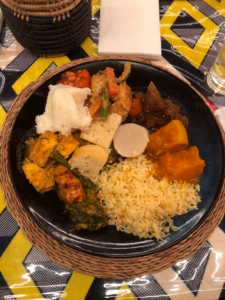
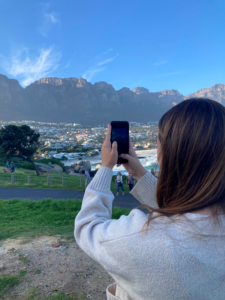 Being here in Cape Town has given me a really great introduction to South African culture and working in communities has allowed me to hear people’s stories and understand what life here is like for a variety of people. This has allowed me to really feel like I am more than just a tourist here as I am engaging with local communities and developing an understanding of the challenges faced by the people living in Cape Town and its surrounding communities. I can’t wait to see the other adventures the rest of this study abroad experience will have to offer!
Being here in Cape Town has given me a really great introduction to South African culture and working in communities has allowed me to hear people’s stories and understand what life here is like for a variety of people. This has allowed me to really feel like I am more than just a tourist here as I am engaging with local communities and developing an understanding of the challenges faced by the people living in Cape Town and its surrounding communities. I can’t wait to see the other adventures the rest of this study abroad experience will have to offer!
Week Two
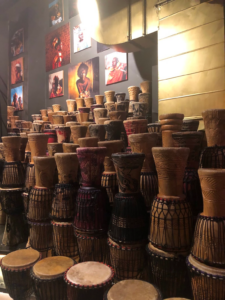 Hi again from South Africa! Tonight is our last night in Cape Town, I can’t believe how fast the time has gone! We concluded our time in the city with a delicious, 14-course dinner at GOLD Restaurant filled with live music, a drum circle, and face paint. It was a great conclusion to our time in the city and it’s been great to see how the sixteen of us have grown together and made lasting friendships during the course of this experience.
Hi again from South Africa! Tonight is our last night in Cape Town, I can’t believe how fast the time has gone! We concluded our time in the city with a delicious, 14-course dinner at GOLD Restaurant filled with live music, a drum circle, and face paint. It was a great conclusion to our time in the city and it’s been great to see how the sixteen of us have grown together and made lasting friendships during the course of this experience.
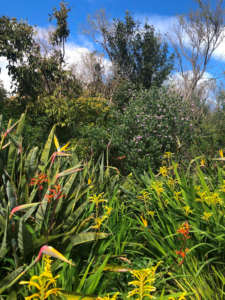 This week, we’ve had to do a good bit of readjusting because of the taxi strike, which I will go into a little bit later. I think the highlight of my week was getting to see more nature in the Cape Town area. On Sunday we visited the Kirstenbosch National Botanical Garden, which started restoration and was made into a botanical garden in 1913 under the first director Harold Pearson, a British botanist who came to teach at the University of Cape Town and saw the need for a garden. There are so many different kinds of plants and birds there, and if you walk up to the top of the garden, you can see the whole city of Cape Town. This week we also visited Table Mountain, where a group of us also decided to hike it. I’m gonna be honest, I did not realize how out of shape I was when I started hiking and I huffed and puffed my way all the way up, but the views were totally worth it. Again, we could see the layout of the whole city as well as the ocean. It was truly breathtaking… although my breath had already been taken by the hike. I think that being able to escape from the hustle and bustle of the city and getting to see all of the beautiful geographical landmarks in Cape Town was much needed and something that I greatly enjoyed.
This week, we’ve had to do a good bit of readjusting because of the taxi strike, which I will go into a little bit later. I think the highlight of my week was getting to see more nature in the Cape Town area. On Sunday we visited the Kirstenbosch National Botanical Garden, which started restoration and was made into a botanical garden in 1913 under the first director Harold Pearson, a British botanist who came to teach at the University of Cape Town and saw the need for a garden. There are so many different kinds of plants and birds there, and if you walk up to the top of the garden, you can see the whole city of Cape Town. This week we also visited Table Mountain, where a group of us also decided to hike it. I’m gonna be honest, I did not realize how out of shape I was when I started hiking and I huffed and puffed my way all the way up, but the views were totally worth it. Again, we could see the layout of the whole city as well as the ocean. It was truly breathtaking… although my breath had already been taken by the hike. I think that being able to escape from the hustle and bustle of the city and getting to see all of the beautiful geographical landmarks in Cape Town was much needed and something that I greatly enjoyed. 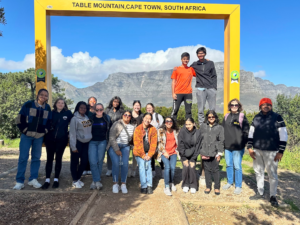
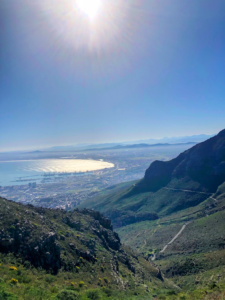 As I previously mentioned, the taxi strikes continued for most of the week, and they were finally called off last night, August 10th. Although I still don’t have a full understanding of all the nuances of the strikes, they started because approximately 6,000 improperly licensed taxi vehicles were impounded by the government over the course of the last six months. The drivers were saying that because they have to make multiple trips in and out of the city every day in order to make enough money to support themselves and their families, they did not have enough time to keep up with all the proper licensing. Previous conversations had been had between the city of Cape Town and the South African National Taxi Council (SANTACO) for some kind of aid or stipend so that drivers could maintain their vehicles, which the government had rejected. Due to the strikes, many people who lived in the townships outside of Cape Town and relied on the taxi system were unable to get to work every day. There was also a lot of violence inside of the townships, which even led to some deaths. After more discussions with the government, SANTACO called off the strikes. Because our hotel is located in a pretty safe area of Cape Town, we were not in any danger during the strikes, but we did have to cancel the remainder of our service learning because it was unsafe for us to travel into the communities that we had been working with. Although I understand that safety is of first priority, this was really disappointing because we had started forming connections with the people we were working with and had some questions to ask, conversations to have, and work to continue. Although some of our previously scheduled activities were canceled, we were still able to meet virtually with the YMCA Athlone and discuss the work they are doing to help engage, educate, and provide health services within communities. We also met with Denisha Anand, who works with the Princess Vlei Forum, and talked to us about the importance of biodiversity, conservation, self-care when engaging in social justice work, and she gave us the background of the taxi strikes. The taxi strikes have shown me the importance of being flexible when studying abroad and following what activities are going on inside of the city and country that you are staying in.
As I previously mentioned, the taxi strikes continued for most of the week, and they were finally called off last night, August 10th. Although I still don’t have a full understanding of all the nuances of the strikes, they started because approximately 6,000 improperly licensed taxi vehicles were impounded by the government over the course of the last six months. The drivers were saying that because they have to make multiple trips in and out of the city every day in order to make enough money to support themselves and their families, they did not have enough time to keep up with all the proper licensing. Previous conversations had been had between the city of Cape Town and the South African National Taxi Council (SANTACO) for some kind of aid or stipend so that drivers could maintain their vehicles, which the government had rejected. Due to the strikes, many people who lived in the townships outside of Cape Town and relied on the taxi system were unable to get to work every day. There was also a lot of violence inside of the townships, which even led to some deaths. After more discussions with the government, SANTACO called off the strikes. Because our hotel is located in a pretty safe area of Cape Town, we were not in any danger during the strikes, but we did have to cancel the remainder of our service learning because it was unsafe for us to travel into the communities that we had been working with. Although I understand that safety is of first priority, this was really disappointing because we had started forming connections with the people we were working with and had some questions to ask, conversations to have, and work to continue. Although some of our previously scheduled activities were canceled, we were still able to meet virtually with the YMCA Athlone and discuss the work they are doing to help engage, educate, and provide health services within communities. We also met with Denisha Anand, who works with the Princess Vlei Forum, and talked to us about the importance of biodiversity, conservation, self-care when engaging in social justice work, and she gave us the background of the taxi strikes. The taxi strikes have shown me the importance of being flexible when studying abroad and following what activities are going on inside of the city and country that you are staying in.
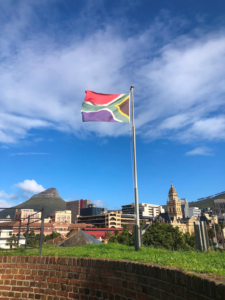 Something that we got to do this week that had not originally been planned in the itinerary, was visit the Castle of Cape Town, which was built by the Dutch using slave labor in order to protect from the English. The Dutch and the English clashed on several occasions in South Africa over who would be the governing colonizer. We also got to go up to Signal Hill to have lunch, which had another incredible view of the city and the ocean. Although the pace of this week was a little slower than last week due to some changes in the schedule, I think it was nice to take a step back in order to process everything we had done and discussed during this trip and take some time to appreciate the nature here.
Something that we got to do this week that had not originally been planned in the itinerary, was visit the Castle of Cape Town, which was built by the Dutch using slave labor in order to protect from the English. The Dutch and the English clashed on several occasions in South Africa over who would be the governing colonizer. We also got to go up to Signal Hill to have lunch, which had another incredible view of the city and the ocean. Although the pace of this week was a little slower than last week due to some changes in the schedule, I think it was nice to take a step back in order to process everything we had done and discussed during this trip and take some time to appreciate the nature here.
Tomorrow morning we leave Cape Town and head to the Aquila Private Game Reserve, where we have two safaris scheduled and we have been promised elephants, lions, giraffes, and more! I will definitely be taking lots of pictures and will share them in my final blog next week!
Return
Hello from home! 🙁 I’ve been back from Cape Town for 5 days now and life at home is just not as fun. I’ve been working on some final course assignments and unpacking, but nothing as interesting as talking to people and learning about social activism.
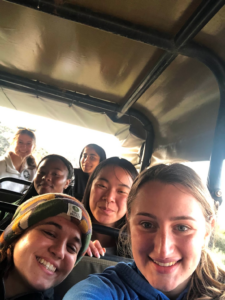 Our final weekend in Cape Town was one of my favorite experiences from the whole
Our final weekend in Cape Town was one of my favorite experiences from the whole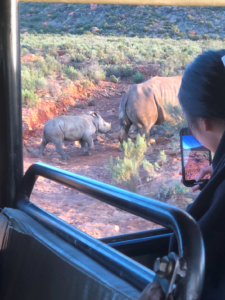 trip there. We were at the Aquila Private Game Reserve and we got to go on two safaris. On the first one, we were able to see giraffes, elephants, lions, zebras, antelope, baboons, hippos, and rhinos.
trip there. We were at the Aquila Private Game Reserve and we got to go on two safaris. On the first one, we were able to see giraffes, elephants, lions, zebras, antelope, baboons, hippos, and rhinos.
It was really such a cool experience and I did not think that it could be topped the next morning, but I was definitely wrong about that. Sunday morning we saw a baby rhino and its mother and a watering hole standoff between an elephant that was just playing in the water and some hippos who were a bit threatened by its presence there. I’ll add a bunch of pictures at the bottom of this blog post! One of the other things about being at the Reserve was just how beautiful it was there. It was full of mountains and had an incredible sunset, sunrise, and view of the stars at night. It was definitely a fantastic way to end the trip and an experience that I’ll never forget.
Overall, my time in Cape Town was nothing short of amazing. I got to talk to so many people, build new friendships with people at UMBC that I probably would have never otherwise met, and learn so much. Getting to fully immerse myself in a new city and country for two and a half weeks taught me more about the world and allowed me to grow as a global citizen. I also learned a lot about myself and the traveler that I am. I will definitely try to come back to South Africa again, there’s so much left to explore that I didn’t even get the chance to think about yet!

